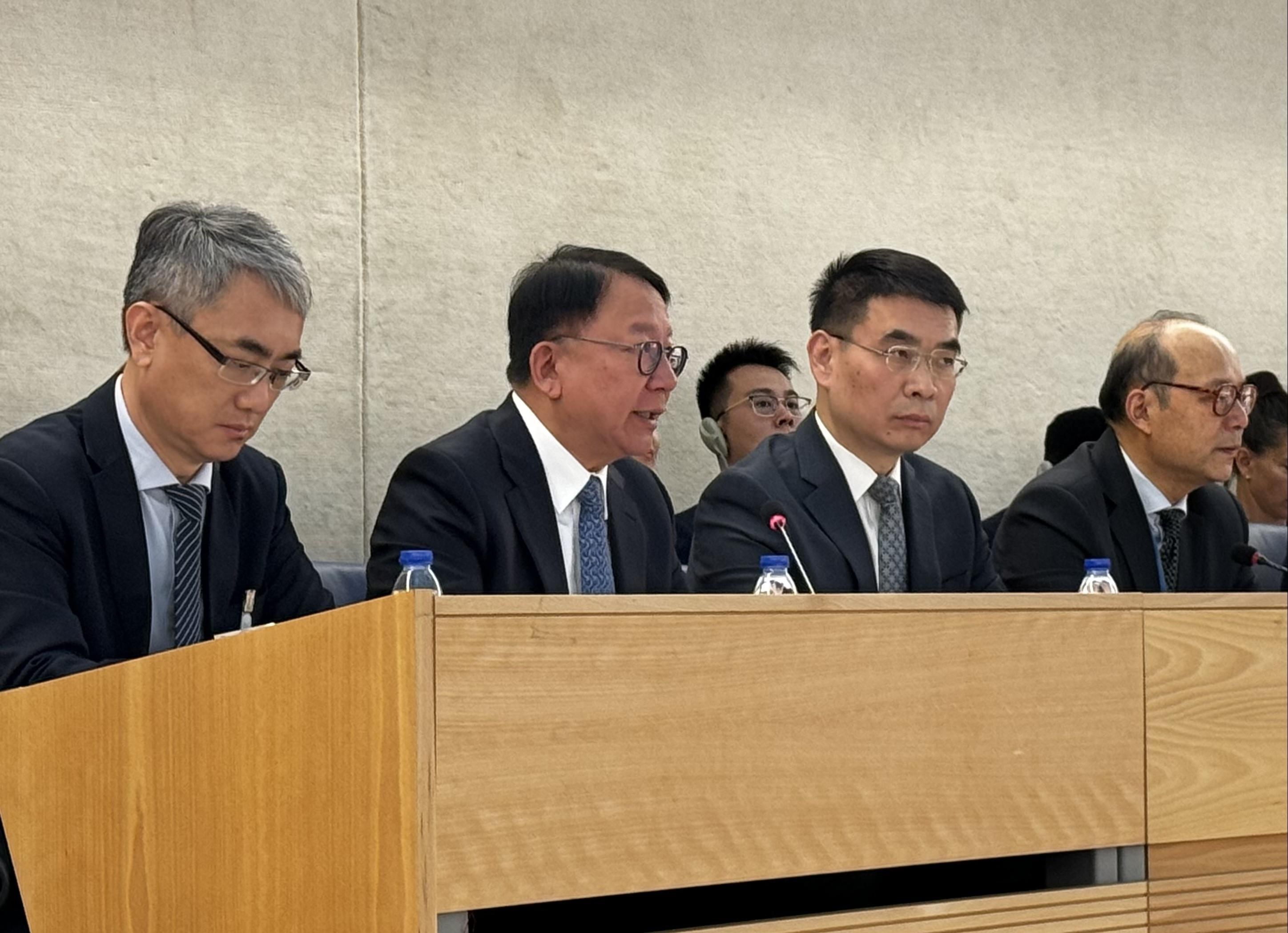 Chief Secretary for Administration Eric Chan Kwok-ki (second left), as Deputy Head of China's delegation, delivers his remarks at the meeting of the United Nations Human Rights Council's Universal Periodic Review Working Group in Geneva, Switzerland, on Jan 23, 2024. (PHOTO / HKSAR GOVERNMENT)
Chief Secretary for Administration Eric Chan Kwok-ki (second left), as Deputy Head of China's delegation, delivers his remarks at the meeting of the United Nations Human Rights Council's Universal Periodic Review Working Group in Geneva, Switzerland, on Jan 23, 2024. (PHOTO / HKSAR GOVERNMENT)
HONG KONG - Chief Secretary for Administration Eric Chan Kwok-ki on Tuesday sternly refuted the unfounded and untrue remarks made about the human rights situation in the Hong Kong Special Administrative Region during a United Nations Human Rights Council meeting in Geneva, Switzerland.
Chan responded to the comments and unfounded remarks from a small group of countries at the meeting of the UNHRC’s Universal Periodic Review Working Group, which examined China's fourth report--including a part concerning the HKSAR—that was submitted under the council’s Universal Periodic Review mechanism.
“Various comments and concerns on Hong Kong were raised today. However, some of these clearly come from misconceptions and a lack of understanding about our real situation,” Chan said.
Chan said the HKSAR government is firmly committed to the protection of human rights and always seeks to “make improvements suited to Hong Kong's realities”
He said the HKSAR government is firmly committed to the protection of human rights and always seeks to “make improvements suited to Hong Kong's realities”.
ALSO READ: HKSAR human rights report submitted for UN review
“We have expanded support for women, children, the elderly, the disadvantaged, the ethnic minorities, our imported workers; and we have emerged from challenges with even greater strengths,” Chan said.
He said law enforcement actions in the territory are taken strictly in accordance with the law, including the protection of fundamental rights.
“Such actions are entirely based on available evidence and applicable law, and have nothing to do with a person's background, occupation or political stance,” Chan said, adding that it was "inappropriate" to comment on pending legal proceedings in the city's judiciary.
He said judges decide national security cases independently and the suggestion that “certain individuals or groups should be immune from legal consequences for their illegal acts is no different from advocating a special pass to break the law”.
ALSO READ: UN committee must remain objective to keep its credibility
“This totally runs contrary to the spirit of the rule of law,” Chan said. “It is the legitimate right and duty of every state to safeguard its national security, and to do so by enacting laws is in line with international practice.”
He said that the HKSAR government has the constitutional responsibility to enact local legislation to safeguard national security.
“The provisions of the Basic Law, including those on the protection of human rights, will be fully observed when we take forward the legislative exercise,” Chan said. “No country will watch with folded arms in the face of acts and activities that endanger national security.”
He said that that, before the National Security Law for Hong Kong was enacted, violent and random assaults took place in the city’s streets in 2019.
“Thousands of petrol bombs were thrown; public property was destroyed; traffic was brought to a standstill; and law enforcement officers were viciously attacked. Our community was traumatized,” he said.
Chan said fundamental rights and freedoms, including freedom of speech and of the press, are guaranteed by the territory’s Basic Law
READ MORE: HK govt: UN committee's conclusions 'biased, misleading'
Chan said the NSL was enacted to bring back stability, security, and the rights and freedoms which people in Hong Kong had been deprived of during the period of violence.
“Its implementation has played an important role, allowing Hong Kong residents to return to their peaceful and prosperous way of living,” he said.
Chan said fundamental rights and freedoms, including freedom of speech and of the press, are guaranteed by the territory’s Basic Law while Article 4 of the NSL clearly stipulates that human rights shall be respected and protected in safeguarding national security.
“Many rights and freedoms are not absolute, and the ICCPR (International Covenant on Civil and Political Rights) clearly states that they can be restricted by law where necessary to ensure national security or public order, or to protect the rights and freedoms of others,” he said.
Chan, Deputy Head of China's delegation, attended the meeting together with officials of the HKSAR government as members of the delegation.



